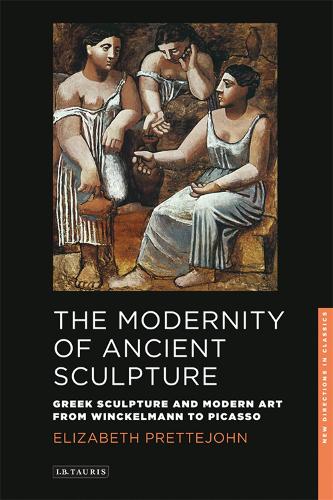
The Modernity of Ancient Sculpture: Greek Sculpture and Modern Art from Winckelmann to Picasso
(Paperback)
Publishing Details
The Modernity of Ancient Sculpture: Greek Sculpture and Modern Art from Winckelmann to Picasso
By (Author) Elizabeth Prettejohn
Bloomsbury Publishing PLC
I.B. Tauris
30th July 2012
United Kingdom
Classifications
Tertiary Education
Non Fiction
Sculpture
Ancient history
733.30938
Physical Properties
Paperback
320
Width 152mm, Height 226mm, Spine 26mm
510g
Description
What can modern art have to do with ancient sculpture Surely the excitement of modern art lies in its utter repudiation of classical example Elizabeth Prettejohn's important and revisionist new book argues otherwise: that ancient sculpture and modern art have been in constant dialogue since Johann Joachim Winckelmann invented the modern discipline of art history. It shows how ancient sculptures could inspire artists such as Rodin, Leighton or Picasso, and how modern artworks could help to interpret sculptors such as Pheidias and Praxiteles. The Modernity of Ancient Sculpture will have strong appeal to students of modern art and the classics alike.
Reviews
'It may not be an overstatement to say that Elizabeth Prettejohn is perhaps the single most historiographically significant art historian writing today, and that The Modernity of Ancient Sculpture is, if anything, even more impressive than her former work on beauty and Victorian art. As in her earlier work, the depth and breadth of research displayed here is as startling as it is enviable, here extending across any number of languages and regions, as well as disciplines - archaeology, classics, philosophy, museology, art history, literature - and in periods stretching from antiquity to the present. Never less than persuasive, in the subtlety and accessibility of its visual or verbal analyses, the book includes revelatory ideas on almost every page.' - Jason Edwards, Reader in the History of Art, University of York 'This is a wonderful book. It does something that is original, timely, persuasive. It does it with clarity, brevity and sensitivity. It commands, with enviable ease, both ancient and modern data, and moves seamlessly and to excellent effect between evocative description and theoretical criticism. This is a book which any graduate student starting to work on ancient art will in future have to read. It is fundamentally enlightening about the way in which sculpture has been studied - and about what it is to study sculpture. It is a book that would work well with undergraduates from their second year on when they have already learnt something of either ancient art or the art history of the last quarter of a millennium. It is certainly a book that the exhibition-going public and the serious visitor to the British Museum (or indeed to English country houses with classical sculpture collections) ought to read as well. It manages to be repeatedly eye-opening.' - Robin Osborne, Professor of Ancient History, University of Cambridge
Author Bio
Elizabeth Prettejohn is Professor of History of Art at the University of Bristol. A member of Tate Britain Council, she has published many books which include Rossetti and his Circle (1999), Frederick Leighton: Antiquity, Renaissance, Modernity (1999, co-edited with Tim Baringer), Beauty and Art, 1750-2000 (2005) and Art for Art's Sake: Aestheticism in Victorian Painting (2009).
